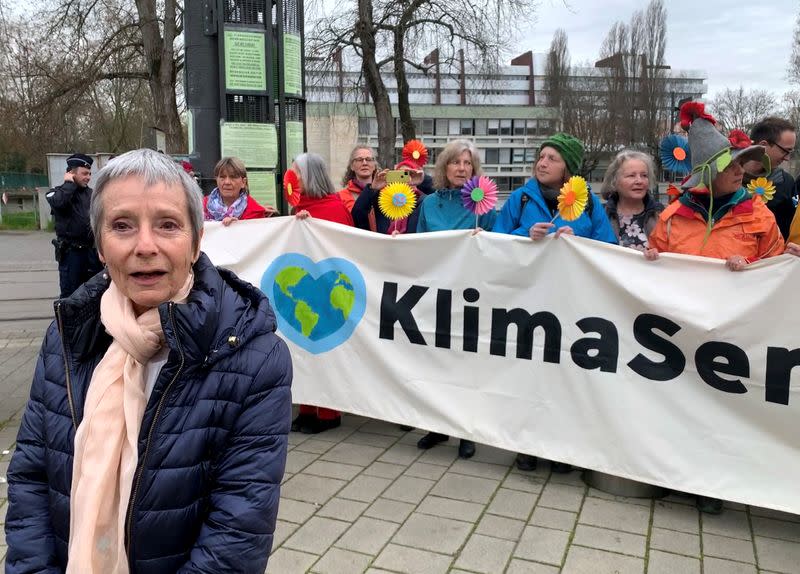Elderly Swiss women bring European court's first climate case
By Emma Farge
STRASBOURG (Reuters) -Thousands of elderly Swiss women have joined forces in a groundbreaking case heard on Wednesday at the European Court of Human Rights, arguing that their government's "woefully inadequate" efforts to fight global warming violate their human rights.
The first climate change case at the Strasbourg court has been brought by a group of Swiss female pensioners who claim that their country's inaction in the face of rising temperatures puts them at risk of dying during heatwaves.
The hearing in the court's top bench, the Grand Chamber, will be followed by two others and would set an important precedent since the women's' lawyers are seeking an ambitious ruling that could force Bern to cut carbon dioxide emissions much faster than planned.
More than 100 supporters and climate activists from Greenpeace gathered outside the courtroom, holding banners and flowers. They chanted "bravo" as each woman exited the court and blew bubbles and rang cow bells amid clapping and cheering.
Bruna Molinari, who is 81 and suffers from asthma that she says is aggravated by excessive heat, told Reuters she hoped the outcome would at least benefit generations to come. "As a grandmother and mother, I think they have the right to have a climate that is better than the one we have," she said, coughing throughout.
Stefanie Brander, a member of the association Senior Women for Climate Protection, said that she felt the government had underestimated the group until now.
"We were taken for old women who did not have a clear idea of the issues ... and I think that could now turn against them," she told Reuters outside the courtroom.
BYPASSING DEMOCRACY?
Switzerland is warming at more than twice the global rate and its glaciers are melting fast. Bern outlined a plan to make deeper emissions cuts but voters rebuffed it in 2021 as too burdensome.
However King's Counsel Marc Willers, representing the applicants, said Switzerland had "no excuse for its failure to protect the applicants' rights".
"If a country as rich and technologically advanced as Switzerland cannot do its fair share – I go further, does not even take the trouble to assess what its fair share should be – what hope is there that other countries will step up to the challenge we face?," he told the packed courtroom.
The Swiss government, which twice won in domestic courts in a six-year legal battle, has argued that the case is inadmissible. Bern's lawyer Alain Chablais told the court that any prescriptive measures issued by the court would represent an overreach, giving it a "quasi-legislative" role.
Eight other governments have joined the case. One of them, Ireland, said on Wednesday there were "insuperable difficulties" with the applicants' case, saying it was asking the court to bypass the democratic process.
The case has been fast-tracked and a verdict is due later this year.
The court will also hear on Wednesday a complaint brought by Damien Carême, a member of the European Parliament for the French Green party, who is challenging France's refusal to take more ambitious climate measures.
(Reporting by Emma Farge; Editing by Giles Elgood and Alex Richardson)

 Yahoo News
Yahoo News 





